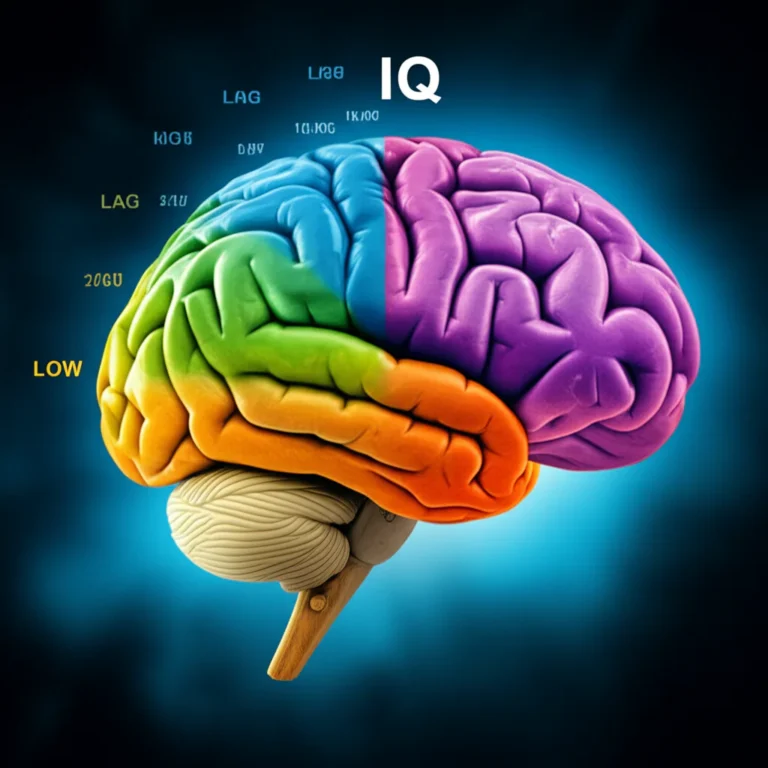Support our educational content for free when you buy through links on our site. Learn more
Average IQ Score by Age [2024]
Have you ever wondered how your IQ compares to others your age? Intelligence quotient, or IQ, is a measure of cognitive ability and is often used to assess a person’s intellectual potential. In this article, we will explore the average IQ scores by age and provide you with a comprehensive understanding of how IQ scores vary throughout different stages of life.
Table of Contents
- Quick Answer
- Quick Tips and Facts
- Background and History
- Understanding IQ Scores
- Average IQ Scores by Age
- Factors Affecting IQ Scores
- Is 120 a Good IQ?
- What is the Average IQ for Each Age?
- Is an IQ of 127 Gifted?
- What is Elon Musk’s IQ?
- FAQ
- Conclusion
- Recommended Links
- Reference Links
Quick Answer
The average IQ score by age varies, with the average IQ being 100 for all age groups. However, it is important to note that IQ scores are not fixed and can change over time. Factors such as education, environment, and genetics can influence IQ scores. It is also worth mentioning that IQ tests measure a specific type of intelligence and may not capture the full range of a person’s abilities.
- IQ stands for Intelligence Quotient and is a measure of cognitive ability.
- The average IQ score is 100 for all age groups.
- IQ scores can change over time due to various factors.
- IQ tests measure a specific type of intelligence and may not capture all abilities.
Background and History

The history of IQ testing dates back to the early 20th century when French psychologist Alfred Binet developed the first modern intelligence test. Binet’s test aimed to identify children who needed additional educational support. Over the years, IQ tests have evolved and become more standardized, with the Wechsler Adult Intelligence Scale (WAIS) being one of the most widely used IQ tests today.
Understanding IQ Scores
IQ scores are calculated by comparing an individual’s performance on an IQ test to the performance of a standardized sample of the population. The average IQ score is set at 100, with scores above or below indicating above or below average intelligence, respectively. IQ scores are typically distributed on a bell curve, with the majority of people falling within the average range.
It is important to note that IQ scores are not a measure of a person’s worth or potential. They simply provide a snapshot of a person’s cognitive abilities at a specific point in time. IQ scores can be influenced by various factors, including genetics, education, environment, and individual effort.
Average IQ Scores by Age
While the average IQ score is 100 for all age groups, research has shown that IQ scores tend to increase during childhood and adolescence, peak in early adulthood, and then gradually decline in older age. This pattern is known as the “Flynn effect,” named after psychologist James Flynn, who observed a consistent rise in IQ scores over time.
Here is a breakdown of average IQ scores by age group:
-
Children (Ages 6-16): The average IQ score for children is around 90-110, with scores gradually increasing as they grow older and develop cognitive skills.
-
Adolescents (Ages 17-19): IQ scores for adolescents are similar to those of children, with an average range of 90-110. However, some individuals may experience a slight increase in IQ during this transitional period.
-
Young Adults (Ages 20-29): This age group typically exhibits the highest average IQ scores, ranging from 100-120. Young adults are often at the peak of their cognitive abilities, benefiting from education and life experiences.
-
Adults (Ages 30-59): IQ scores for adults tend to stabilize and remain relatively consistent during this stage of life. The average IQ score for adults is around 100, reflecting the overall population average.
-
Older Adults (Ages 60+): As individuals enter their senior years, IQ scores may gradually decline. However, it is important to note that intelligence is a complex construct, and older adults can still maintain high levels of cognitive functioning.
Factors Affecting IQ Scores
IQ scores can be influenced by various factors, including:
-
Genetics: Research suggests that genetics play a role in determining a person’s IQ. However, it is important to note that genetics is not the sole determinant of intelligence, and environmental factors also play a significant role.
-
Education: Access to quality education and intellectual stimulation can positively impact IQ scores. Individuals who have had educational opportunities and engaged in intellectually challenging activities may have higher IQ scores.
-
Environment: Environmental factors, such as socioeconomic status, nutrition, and exposure to toxins, can affect IQ scores. Children growing up in disadvantaged environments may face additional challenges that can impact their cognitive development.
-
Individual Effort: Personal motivation, curiosity, and effort can also influence IQ scores. Individuals who actively seek out intellectual challenges and engage in lifelong learning may experience cognitive growth and higher IQ scores.
It is important to remember that IQ scores are not fixed and can change over time. With the right opportunities, support, and effort, individuals can improve their cognitive abilities and reach their full potential.
Is 120 a Good IQ?
An IQ score of 120 is considered above average and falls within the “superior” range. Individuals with a score of 120 have cognitive abilities that are higher than the majority of the population. However, it is important to note that IQ scores are just one measure of intelligence and do not capture all aspects of a person’s abilities.
What is the Average IQ for Each Age?
The average IQ score for each age group is as follows:
- Children (Ages 6-16): Average IQ score of around 90-110.
- Adolescents (Ages 17-19): Average IQ score of around 90-110.
- Young Adults (Ages 20-29): Average IQ score of around 100-120.
- Adults (Ages 30-59): Average IQ score of around 100.
- Older Adults (Ages 60+): Average IQ score that may gradually decline but can still vary widely.
It is important to remember that these are average scores, and individual IQ scores can vary within each age group.
Is an IQ of 127 Gifted?
An IQ score of 127 is considered above average and falls within the “superior” range. While it is not classified as “gifted,” individuals with an IQ of 127 have cognitive abilities that are higher than the majority of the population. Giftedness is typically defined as having an IQ score of 130 or above, but it is important to remember that IQ scores are just one measure of intelligence.
What is Elon Musk’s IQ?
Elon Musk’s IQ is not publicly known. IQ scores are typically kept private, and it is important to note that intelligence is a complex construct that cannot be fully captured by a single number. Elon Musk is known for his exceptional entrepreneurial skills, innovative thinking, and problem-solving abilities, which extend beyond a single IQ score.
FAQ

Is 120 a good IQ?
Yes, an IQ score of 120 is considered above average and falls within the “superior” range.
Read more about “What is the IQ of a Genius? …”
What is the average IQ for each age?
The average IQ score for each age group varies, with the average IQ being 100 for all age groups. However, IQ scores tend to increase during childhood and adolescence, peak in early adulthood, and then gradually decline in older age.
Is an IQ of 127 gifted?
An IQ score of 127 is considered above average and falls within the “superior” range. While it is not classified as “gifted,” individuals with an IQ of 127 have cognitive abilities that are higher than the majority of the population.
What is Elon Musk’s IQ?
Elon Musk’s IQ is not publicly known. IQ scores are typically kept private, and it is important to remember that intelligence is a complex construct that cannot be fully captured by a single number.
Read more about “What is Elon Musk’s IQ?”
Conclusion

In conclusion, IQ scores can vary by age, with the average IQ being 100 for all age groups. IQ scores tend to increase during childhood and adolescence, peak in early adulthood, and then gradually decline in older age. However, it is important to remember that IQ scores are not fixed and can change over time. Factors such as genetics, education, environment, and individual effort can influence IQ scores. It is also important to note that IQ scores are just one measure of intelligence and do not capture the full range of a person’s abilities.
If you’re interested in finding out more about IQ tests, improving your IQ, or exploring other related topics, check out our Free IQ Tests and IQ Test Preparation articles.
Recommended Links
- CHECK PRICE on:
- Shop Mensa IQ Tests on:
- Shop IQ Test Preparation Books on:
- Shop IQ Test Scores Books on:
Reference Links
For more information about IQ tests and the Wechsler Adult Intelligence Scale, you can refer to the following links:






